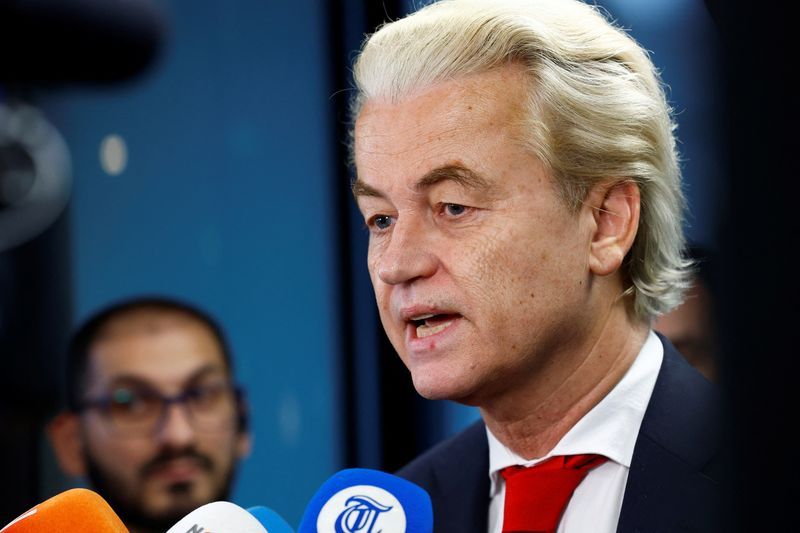By Charlotte Van Campenhout
AMSTERDAM (Reuters) -The Netherlands' right-wing government said on Wednesday it would seek to opt out from the European Union's migration rules if and when the bloc next renegotiates its core treaties - even though this is unlikely to happen any time soon.
In power since July, the government led by Geert Wilders' nationalist, anti-Islam PVV party has said it wants to clamp down on unwanted arrivals and aims for the "strictest-ever asylum regime", with stronger border checks and harsher rules for arriving asylum-seekers.
Immigration is a hot-button issue in the Netherlands, as in much of the 27-nation EU, and the PVV's hard line explains much of its popularity.
"I just informed @EU_commission that I want a migration opt-out for the Netherlands within Europe," PVV Asylum and Migration Minister Marjolein Faber said on X.
"We need to be in charge of our own asylum policy again!", Faber said, in words reminiscent of similar, immigration-focused political slogans in Britain and elsewhere in recent years.
However, the official letter Faber sent to the European Commission is more nuanced and shows the Netherlands is not trying to opt out now from the EU's newly agreed immigration pact, which was years in the making and entered into force in June, but hopes to do so at a later stage.
"This government aims to drastically reduce the volume of migration to the Netherlands," Faber wrote, adding that, to achieve this aim, it "will call for an opt-out from the European asylum and migration acquis in case of Treaty amendment".
"I know this will take a long time, but it is a sign that a new wind is blowing," Wilders said in parliament.
NO CHALLENGE TO EXISTING MIGRATION PACT
No EU treaty change is expected any time soon, however.
Faber made clear that the Netherlands would meanwhile implement the pact, saying it was "essential" for limiting the influx of migrants.
The European Commission promptly responded that it did not expect any changes to asylum rules soon, and welcomed the fact that Faber had pledged to abide by the existing ones.
Under the pact, each EU country will be assigned a share - proportional to economy and population - of the total 30,000 asylum-seekers that the bloc is expected to take in per year. Rights groups say this number, based on the number of irregular border crossings and sea rescues, is too low.
Countries unwilling to take people in would instead contribute to those that are willing with personnel, equipment or funds.
According to EU data, the Netherlands received two first-time asylum applications per 1,000 residents in 2023, close to the bloc's average. Ten member states had a higher proportion.
However, after years of budget cuts, its sole registration centre for asylum-seekers is often overwhelmed, occasionally leaving hundreds to sleep outdoors.

Wilders has said he wants the Netherlands to become less attractive to asylum-seekers, adding that "people in Africa and the Middle East will start thinking they might be better off elsewhere".
The Dutch coalition parties have said they also want to curb labour migration, while admission of foreign students to Dutch universities is set to become stricter.